‘We are well-paid animals in a zoo’: Why Robin Wright decided not to be a star
The actress, whose career has featured cult films, blockbusters and major dry spells, returns to the screen under the direction of Spanish director Juan Carlos Fresnadillo in ‘Damsel’
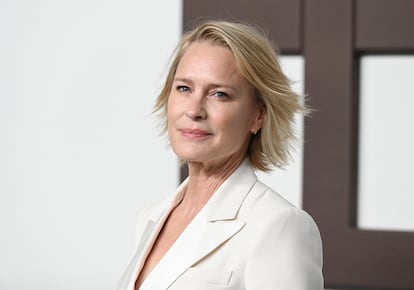
When William Goldman saw Robin Wright (Texas, 57 years old) for the first time, he thought that one day she’d be the world’s biggest star. He said as much in his indispensable book Adventures in the Screen Trade. If there’s one thing that the man who wrote the scripts of Butch Cassidy and the Sundance Kid and All The President’s Men, and who witnessed the rise of legends like Robert Redford, knew how to recognize, it was talent. She had come to his house to seek his approval: as the screenwriter and author of The Princess Bride, Goldman’s contract stipulated that he would have final say on the choice of the film’s leading lady. “Well, that’s what I wrote,” he said. They had found his “most beautiful creature in the land”.
Nearly four decades after that meeting, Wright is a respected actress, has worked on important films and accumulated six Emmy nominations and four from the Golden Globes, but has never been close to becoming the world’s biggest star. Why not? Because she didn’t want to be. “Oh yeah, they wanted to make me America’s sweetheart,” she told The Guardian. “They wanted to make me the next big ingenue, the studio bosses behind the curtain. But what happened was that I turned down a lot of movies that simply didn’t blow my dress up. Plus, I was too busy being a mom at the time.” Hollywood kept trying, until the phone stopped ringing.
Things happened fast in the life of Wright. When she was two years old, her parents split up and she and her brother went with their mother; at 10, Wright’s dream was to be a ballerina on Broadway and she trained throughout nearly every waking hour. At 14, she was a model, doing ads for Maybelline and Doritos. At 16, she tried out for the cast of a John Hughes teen movie, but Molly Ringwald got the role every time. She never got the call from Hughes, but television did come knocking. She made her TV debut in 1984 with The Yellow Rose, a Western co-starring Sam Elliot and Cybill Shepherd, and soon after became one of the stars of Santa Barbara, one of U.S. television’s great soap operas. For 538 episodes, she played Kelly Capwell, the innocent, dreamy daughter of the series’ central family, who was all too often caught up in kidnappings, murder attempts and siblings who appeared out of nowhere.
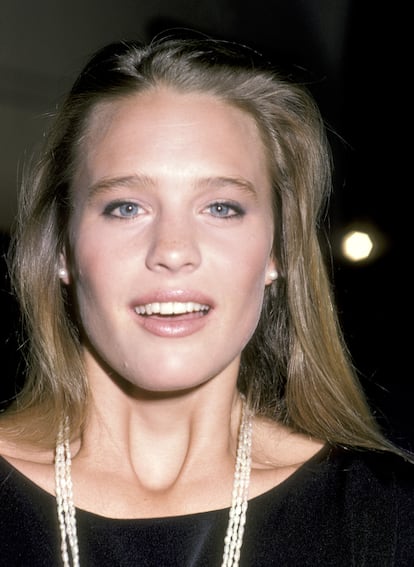
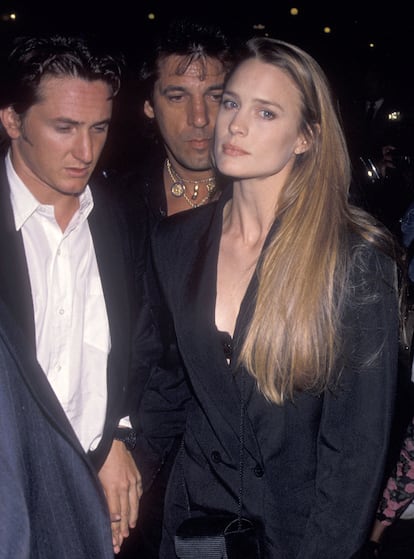
Wright had only good words to say about the series she acted in for four years. “We were sometimes doing 18-hour days, and it was an hour-plus drive home, so I often just slept in my dressing room at NBC Studios,” she remembered. “You had to manage your time, your sanity, and your immune system. But what I really learned was the technical side of performing. How do you not only remember your lines but also when you need to turn a bit to the left to favor camera one or at which line you need to face camera three.”
Too childish for the adults, too adult for the kids
And then The Princess Bride (1987) appeared. After beating out Meg Ryan and Courtney Cox in the casting call, she was faced with her first film role, and she didn’t want to blow it. But she lacked formal training, and was terrified of working with established movie actors. “I did not act. It was mostly telling myself, ‘Don’t be an idiot in front of Mandy Patinkin and Christopher Guest.’ And Cary [Elwes] was so good-looking. I was convinced we were going to be married,” she told Town & Country.
Today, it’s a cult movie, but in the 1980s, the film was a wild card. The name of its director, Rob Reiner, still meant nothing (Stand By Me had not been released and When Harry Met Sally, A Few Good Men and Misery didn’t exist yet). Elwes’s face was not yet familiar and Billy Crystal, the best-known actor in the cast, wore makeup that made him completely unrecognizable. But it did offer an irresistible combination of adventure, romance, comedy, friendship, love and fantasy. On paper it was perfect, but there was one problem: no one knew how to sell it. Too childish for the adults, too complex for the kids. The faint praise it garnered upon its release did little to contribute to Wright’s star power.
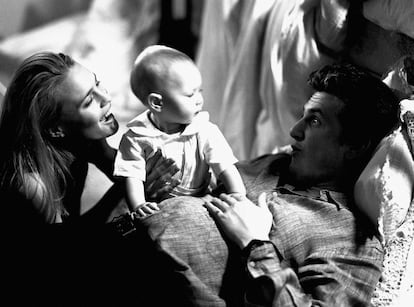
During the filming of State of Grace (1990) she met Sean Penn and they began dating. Both had been previously married. She, for a couple years to her Santa Barbara co-star Dane Witherspoon and he to Madonna, a turbulent matrimony that had been the delight of the tabloids. Before she turned 26, Wright had two children with Penn. They made a deal: one of the two of them would always have to be at the house to take care of the kids, the kind of agreement that has figured in the downfall of many a promising actress.
They got married. Wright began going by Robin Wright Penn, and stopped accepting as many roles (between 1987 and 1994, she made only four films) while her husband competed for the title of best actor of his generation. The choleric Penn and sweet-natured Wright were together for 18 years full of breakups and makeups that turned them into a favorite topic in the press, which would not let up on its scrutiny of a relationship that it often portrayed as a kidnapping, with Wright the victim of Stockholm syndrome. As the tabloids had predicted, the pairing did not end well.
“[Robin] is a ghost to me now,” declared Penn after the divorce. “We spent all those years together… Now she’s just gone.” She was more explicit. “Perhaps it’s not ladylike [to say], but I’ve never laughed more, read more, or come more than with Ben,” she told Vanity Fair in 2015. That Ben was Ben Foster, an actor 14 years her junior who, relevant to their story or not, had previously been hailed as “the next Sean Penn”. They broke up a few months later. During their brief engagement, they spoke about their love as if no one in history had ever fallen so hard, got their respective initials tattooed and showed up on every red carpet that demanded their presence.
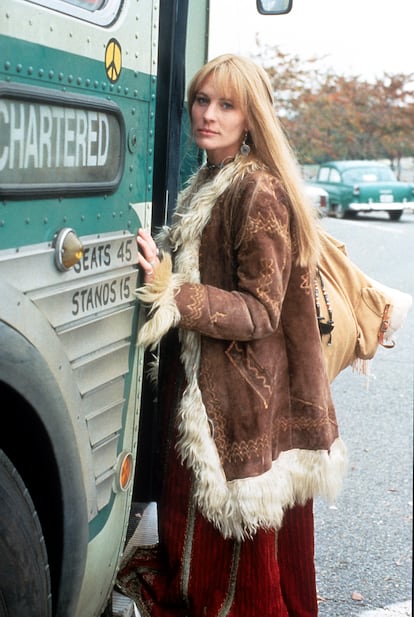
She never made it to the altar with Foster, but she did with Clément Giraudet, a Saint Laurent executive who was two decades than her. They married in secret in August 2018 in France and spent their honeymoon in Ibiza. Wright petitioned for divorce four years later.
After her marriage with Penn she was, he claimed, a ghost. But during their relationship, the descriptor rings true when it comes to her professional career. Until, that is, in 1994 when she would take the role that would define her career, the sweet and tortured Jenny Curran in Forrest Gump. She was nominated for a Golden Globe and the world wondered where she had been. Once again, it seemed that a resplendent future lay in front of her. Not yet 30, Wright’s return seemed like the kind of comeback that Hollywood adored, but once again, she refused to play the game. “For actors in Hollywood, it’s very straightforward: we’re well-paid animals in a zoo. And if you agree to play the dog-and-pony show, and smile on the red carpet, and show up at every fucking envelope that’s opened, then you can become a celebrity and become a commodity. But if you choose not to do that, you are seen as not bankable,” she lamented to The Guardian in 2014.
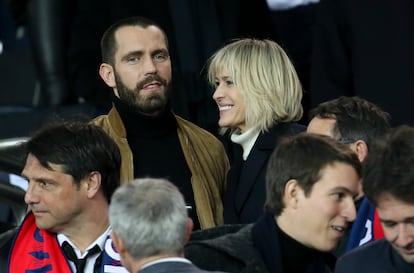
In the ‘90s, she starred in Moll Flanders (1996), received a SAG-AFTRA nomination for Best Actress for her role in She’s So Lovely (1997). Later, she’d work on two risky productions in the animated Beowulf (2007) and Adore (2013), in which she and Naomi Watts played two friends who sleep with each other’s son. But the bulk of Wright’s career could have been summed up by a line Danny Huston delivers to her character in The Congress about her films over the last 15 years having been a failure. In that visionary Ari Foldman-directed project, Wright plays Robin Wright, a 40-year-old actress who dazzled in The Princess Bride and Forrest Gump and whose studio, Miramount, wants to digitalize her image in order to preserve her in her twenties and thus, recover the money she cost them with “her bad choices”. Those bad choices were real: she turned down the role that Laura Dern wound up playing in Jurassic Park and also said no to Robin Hood: Prince of Thieves, Batman Forever, The Coverup and Born on the Fourth of July, claiming that its director Oliver Stone had a problem with women.
And then came Netflix
It was the North American version of The Girl with the Dragon Tattoo, which premiered in 2011, that gave her career an unexpected boost, not so much due to its impact (so sparse that the planned trilogy still lacks its final installment), nor her minor role, but rather the effect she had on the film’s director, David Fincher, who convinced her to play Claire Underwood in House of Cards.
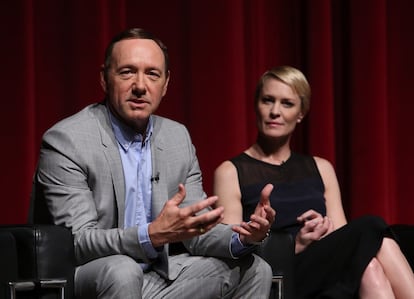
Today, Netflix is synonymous with success, its products seen by more viewers than any cinematographic release. But at the time, it was a mystery, and for no one more than Wright. “I didn’t want to do television. I’d been stuck on Santa Barbara for years and remembered how hard it was to do those long hours and memorize 10 to 15 pages of dialogue a day,” she told the Harvard Business Review. “I loved film. I loved that you got to travel and experience other cultures and play different characters instead of being stuck with one. But David said, ‘Trust me.’” The filmmaker assured her that it would be a revolutionary project, 13 hours in which to develop a personality in a series that viewers could watch whenever they wanted, and at their own rhythm. The future. The actress complained about the character’s meager development in the British original, and the role was modified. “We’re going to build this character together,” she remembers Fincher telling her. “She’ll ultimately become Lady Macbeth to his Richard III.”
The awards she’d later when validated Fincher’s resolve. She became a style icon through the luxurious, pristine wardrobe and her androgynous hairstyle, a highly praised fluke. “I was just cutting off damaged hair – too much bleach over months of [appearing in] different movies.” She also became a standard-bearer for gender equality in Hollywood: when she discovered that Netflix had deceived her, and that she was not being paid the same amount as Spacey, she threatened to leave the series. Between 2014 and 2016, Spacey went from making $500,000 to a million dollars per episode, while Wright was charging $420,000. Her demands were met. “We should encourage the younger generations to express themselves. Feminism means equality, period. Equal work, equal pay.” In 2017, she told reporters, at a Cannes press engagement commemorating her directorial debut, that Hollywood had to evolve, and that the responsibility lay with the people who make the decisions about which movies to finance — who are largely men.
She was also impacted by the series’ other, more serious controversy. Allegations of sexual assault against Spacey led to the actor being fired from House of Cards, which still had one season left to film. The powers-that-be decided to place all bets on Wright and, although the series’ final season is generally regarded as its weakest — after a certain point, it was impossible to keep presenting new plot twists — Wright’s performance was praised. “Kevin and I knew each other between ‘action’ and ‘cut,’ and in between setups where we would giggle. I didn’t know the man. I knew the incredible craftsman that he is,” she told the Today show. “We were co-workers, really. We never socialized outside of work.”
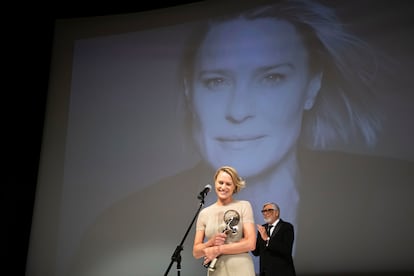
Wright’s comments about not being “bankable” may have less to do with her economic interests or desire to stroke her own ego, as much as her desire to give more visibility to the causes that inspire her. For years, she has been involved in awareness campaigns around the situation in the Congo (the country’s conflict is the deadliest the planet has seen since World War II), and particularly, the impacts that war has had on women.
Somewhere along the way, she has lost her reluctance when it comes to working on blockbusters. In recent years, she has played the powerful, toned General Antiope in Wonder Woman (2020) and its sequel, and joined the cast of Denis Villeneuve’s Blade Runner (2017). The world has been introduced to a new Robin Wright, a star that Rebeca Millers, Wright’s director on The Private Lives of Pippa Lee, calls “a great actress trapped inside the body of a Norse goddess.” This month, she returns to Netflix with Damsel, the latest film by Spanish filmmaker Juan Carlos Fresnadillo. It’s another tale about princesses, only this time, she’ll play the story’s villain. Another reinvention for an actress who never wanted to be the biggest star in the world.
Sign up for our weekly newsletter to get more English-language news coverage from EL PAÍS USA Edition
Tu suscripción se está usando en otro dispositivo
¿Quieres añadir otro usuario a tu suscripción?
Si continúas leyendo en este dispositivo, no se podrá leer en el otro.
FlechaTu suscripción se está usando en otro dispositivo y solo puedes acceder a EL PAÍS desde un dispositivo a la vez.
Si quieres compartir tu cuenta, cambia tu suscripción a la modalidad Premium, así podrás añadir otro usuario. Cada uno accederá con su propia cuenta de email, lo que os permitirá personalizar vuestra experiencia en EL PAÍS.
¿Tienes una suscripción de empresa? Accede aquí para contratar más cuentas.
En el caso de no saber quién está usando tu cuenta, te recomendamos cambiar tu contraseña aquí.
Si decides continuar compartiendo tu cuenta, este mensaje se mostrará en tu dispositivo y en el de la otra persona que está usando tu cuenta de forma indefinida, afectando a tu experiencia de lectura. Puedes consultar aquí los términos y condiciones de la suscripción digital.









































